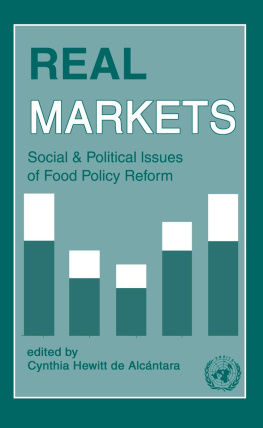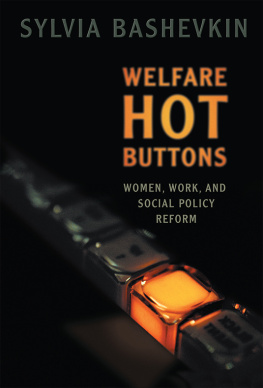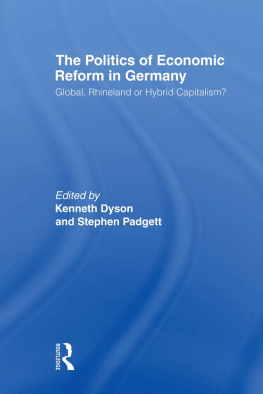REAL MARKETS: SOCIAL AND POLITICAL ISSUES OF FOOD POLICY REFORM The United Nations Research Institute for Social Development (UNRISD) was established to promote in-depth research into the social dimensions of pressing problems and issues of contemporary relevance affecting development. Its work is inspired by the conviction that, for effective development policies to be formulated, an understanding of the social and political context is crucial, as is an accurate assessment of how such policies affect different social groups. The Institute attempts to complement the work done by other United Nations agencies and its current research themes include the social impact of the economic crisis and adjustment policies; environment, sustainable development and social change; ethnic conflict and development; political violence and social movements; refugees, returnees and local society; the socio-economic and political consequences of the international trade in illicit drugs; patterns of consumption; qualitative indicators of development; and participation and changes in property relations in communist and post-communist societies.
Real Markets: Social and Political Issues of Food Policy Reform
edited by
Cynthia Hewitt De Alcntara
First Published 1993 in Great Britain by
FRANK CASS AND COMPANY LIMITED
2 Park Square, Milton Park,
Abingdon, Oxon, OX14 4RN
and in the United States of America by
FRANK CASS
270 Madison Ave,
New York NY 10016
Transferred to Digital Printing 2006
Copyright 1993 UNRISD
British Library Cataloguing in Publication Data
Real Markets: Social and Political Issues
of Food Policy Reform. (Special Issue
of European Journal of Development
Research, ISSN 0957-8811;Vol.4, No.2)
I. Alcantara, Cynthia Hewitt De
II. Series
338.1
ISBN 0-7146-4514 1 (pbk)
ISBN 0-7146-4094 8 (hbk)
Library of Congress Cataloging-in-Publication Data
Real markets: social and political issues of food policy reform /
edited by Cynthia Hewitt de Alcntara.
p. cm.
This group of studies first appeared in a special issue on Real
markets: social and political issues of food policy reform of the
European journal of development research, v. 4, no. 2, December
1992, published by Frank Cass & Co. Ltd.T.p. verso.
Papers presented at a Seminar on Food Pricing and Marketing
Reforms, sponsered by the United Nations Research Institute for
Social Development (UNRISD) and held in Geneva during November 1989.
Includes bibliographical references.
ISBN 0-7146-4514-1
1. Produce tradeDeveloping countriesCongresses. 2. Nutrition
policyDeveloping countriesCongresses. I. Hewitt de Alcntara,
Cynthia.
HD9018.D44R43 1993
363.8091724dc20 92-41261
CIP
This group of studies first appeared in a Special Issue on Real Markets: Social and Political Issues of Food Policy Reform of the European Journal of Development Research, Vol. 4, No. 2, December 1992, published by Frank Cass & Co Ltd
All rights reserved. No part of this publication may be reproduced, stored in a retrieval system, or transmitted in any form, or by any means, electronic, mechanical, photocopying, recording, or otherwise, without the prior permission of Frank Cass and Company Limited.
Contents
| Cynthia Hewitt de Alcntara |
| James Fairhead |
| Ben Crow and K. A. S. Murshid |
| Barbara Harriss |
| Deborah Fahy Bryceson |
| Peter Utting |
Real Markets: Social and Political Issues of Food Policy Reform contains papers presented at a Seminar on Food Pricing and Marketing Reforms, sponsored by the United Nations Research Institute for Social Development (UNRISD) and held in Geneva during November 1989.
Financing for the seminar was provided by the Directorate-General for Development of the Commission of the European Communities.
The authors would like to thank other participants in the seminar for their thoughtful comments: Nick Amin, Kirsten Appendini, Sartaj Aziz, Nyangabyaki Bazaara, Solon Barraclough, Hubert Morsink, Johan Pottier, Philip Raikes, Hans-Otto Sano, Yassin Wehelie and Ann Zammit. They are also grateful to the Director of UNRISD, Dharam Ghai, and to two representatives of the European Commission, Walter Kennes and B. Amat, for supporting the conference; and they wish to express their appreciation to David Lehmann and Maureen Mackintosh for providing insight and encouragement during the preparation of the manuscript for publication.
Irene Ruiz de Budavari and Wendy Salvo contributed indispensable administrative assistance for the project, and Jenifer Freedman copy edited the following texts.
CYNTHIA HEWITT DE ALCNTRA
I
If development policy in the 1980s was consistently shaped by an appeal to market principle, rather narrowly defined, the process of reform in the 1990s already shows signs of increasing concern with market practice - with what a growing number of people are calling the political economy of 'real markets'.
This is the case for a number of reasons. The first is simply the experience of the past decade, which has forcefully illustrated the complexity of efforts at economic restructuring around the world and the difficulties encountered when insufficient attention is paid to a wide range of real market settings in which reform programmes are being applied.
As a lending condition, international financial institutions have routinely imposed a standard set of policy prescriptions, intended to 'get prices right', on a large number of Third World countries with debt-related balance of payments difficulties. Although economic stabilization in a narrow sense has been attained with a certain frequency, this has very seldom led to renewed growth; and it almost always has had regressive effects on income distribution and general welfare []. Furthermore, in many cases, even stabilization itself has proved consistently elusive.
Particularly unsettling for observers of market reforms is the fact that one of the most prominent assertions made by proponents of these programmes, who hoped to better conditions in rural areas, has proved very unreliable in practice. It was consistently predicted that the standard set of corrective measures lying at the centre of reform (including devaluation, reduction of trade barriers and curbs on the role of the state in agricultural marketing) would be strongly favourable to farmers, and in particular to small cultivators or peasants. 'Shifting the terms of trade toward agriculture' was a principal goal of the reform process, and this was expected to provide strong impetus for improving rural livelihood [].
After almost ten years of experience, however, there is abundant evidence that the standard package of market-oriented reforms required to pursue macroeconomic stabilization has not, on the whole, been of benefit to small farmers, and that most rural people are today worse off than they were before the policy experiment began. This is not to say that they might not have suffered equally, or more, if nothing at all had been done to confront economic crisis. It is to say that such an outcome can be expected to raise legitimate questions concerning the adequacy of the set of assumptions utilised to devise a policy remedy.
The central assumption underlying the effort to deal with crisis in many Third World countries during the 1980s has been a relatively rigid one, based on a logical construct (the 'free market') which is open to theoretical and practical challenge on a number of grounds. In its most simplistic form, the assumption holds that resources are allocated in an optimally efficient manner through the impersonal play of supply and demand; and that the roots of crisis lie in the systematic 'distortion' of market signals through inappropriate government interference with free market forces. Since relative prices constitute the basic instrument of market regulation, removal of factors (like fixed exchange rates, price controls and subsidies, restrictions on imports, export taxes and so forth) impeding the automatic adjustment of these prices constitutes, in this view, the single most important step which can be taken to revive economies and - in largely agrarian societies - to ensure that rural people enjoy increased opportunities [].












